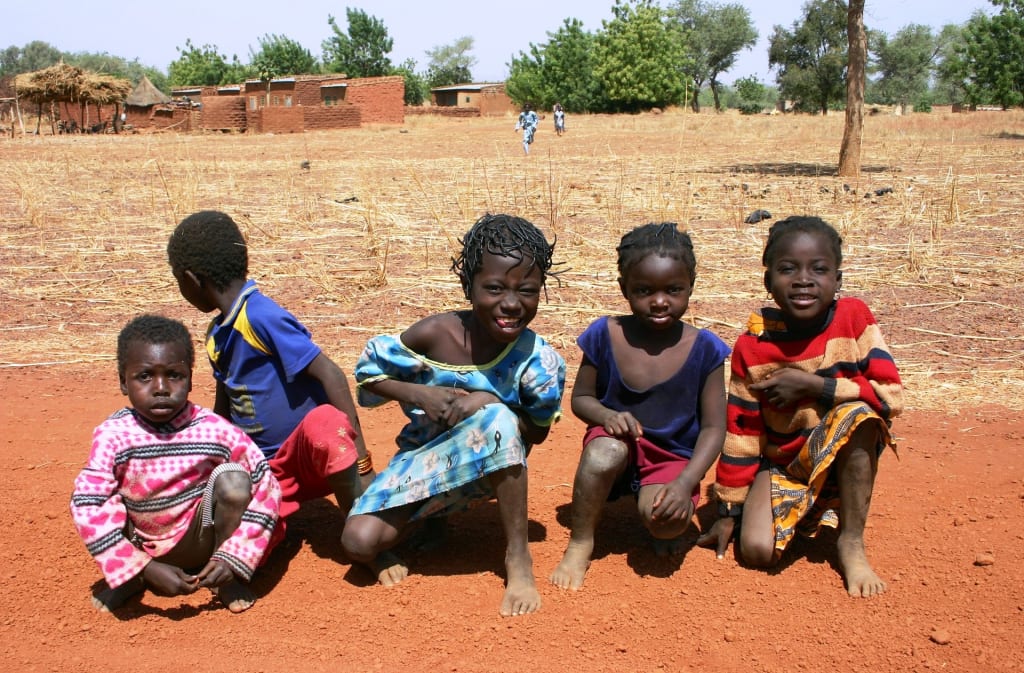Top 10 Poorest Countries 2022 World Wide
Nations hit hardest by destitution are many times nations that are likewise trapped in different emergencies, including struggle, craving, and environmental change. Here, we take a gander at the ten financially most unfortunate nations on the planet, the variables that go into this positioning - and the elements that don't.

At Concern, we go where we are required most in our battle against outrageous destitution. In any case, where is that, precisely? What's more, which nations need the most help?
Obviously, the nations on our rundown are additionally nations hit hard by different variables, including infection, war and struggle, environmental change, and outrageous weather conditions like a dry spell. These frequently become intensifying variables that keep networks caught in patterns of destitution.
What decides the world's most unfortunate nations isn't quite as obvious as dollars and pennies. Before we get into the positioning rundown, how about we take a gander at how these are not set in stone…
On the whole, a disclaimer
"Poor" is a precarious word. While we can rank nations by various monetary and formative variables, much in the way that we can rank the world's hungriest nations, this is additionally only one perspective on the abundance of these countries. For a story like this, it's a sort of rapidly grasped shorthand. What's more, as with general shorthand, it's not completely elucidating.
Our vision is of a world liberated from destitution, dread, and persecution — a reality where everybody is treated with poise and regard. While destitution is a quantifiable unavoidable truth, it doesn't decisively characterize an individual, a family, or a local area. Human pride is intrinsic within each one of us and should be esteemed.
The battle against destitution - assuming it is to be won - rests in the possession of the individuals we work with. Our responsibility is to assist with giving them the devices and assets they need. They have our limitless regard, and that is the reason all of our work begins with paying attention to networks.
Characterizing the most unfortunate nations on the planet
The human side of destitution to the side, sorting the most unfortunate nations on the planet isn't quite as basic as positioning complete riches. Information is frequently rare in absolutely weak nations. Likewise, depending on the total national output (Gross domestic product) as a positioning component doesn't represent a nation's all riches. Regardless of whether we view it as a binding together measurement, how would we represent trade rates?
The Global Financial Asset, World Bank, and Focal Knowledge Office all rank nations by their per-capita GDPs (Gross Homegrown Items). Given the factors at play, be that as it may, these rundowns are marginally not quite the same as each other. Positioning by Gross domestic product likewise implies we're simply positioning by the creation of a country versus its pay.
For the motivations behind this positioning, we will zero in on Gross Public Pay (GNI). We're additionally going to make things one stride further by alluding to the Unified Countries Advancement Program's Human Improvement Reports. This positions the nation by their GNI, yet additionally by the future upon entering the world, anticipated long stretches of tutoring, mean long periods of tutoring, and their own human advancement record (HDI) esteem.
Considering this, here are all the world's 10 least fortunate nations, in slipping request:
10. Mozambique
Mozambique is a country wealthy in normal assets and has taken extraordinary steps towards becoming perhaps Africa's quickest developing economy. Nonetheless, the nation is as yet recuperating from a 16-year nationwide conflict that started when it acquired freedom from Portugal in 1975 and finished in 1992. The 2018 UN Human Improvement Report gauges a gross public pay (GNI) per capita of $1,093 and a future of 58.9. As per the World Bank's latest gauge in 2014, more than 46% of Mozambicans live beneath the destitution line. While it's guessed that residents will finish 9.7 long periods of tutoring, the mean long periods of tutoring finished is simply 3.5.
Concern recently worked in Mozambique somewhere in the range between 1984 and 2017, and got back to the country in 2019 following the landfall of two significant twisters in the nation (counting Typhoon Ida). This crisis reaction has now moved into an early-recuperation stage, as we outfit resource ranchers with seeds and other farming contributions to assist them with supplanting crops obliterated by flooding.
9. Mali
The fourth-biggest country on the African landmass, Mali's capital of Bamako once thrived as a general store. Today, notwithstanding, the country (which acquired freedom from France in 1960) has a GNI per capita of $1,953 and a future of 58.5. Continuous conflict and struggle imply that the mean long stretches of tutoring in the nation are simply 2.3 (contrasted with a normal 7.7 long periods of tutoring). The World Bank's latest information from 2009 uncovers that more than 41% of the populace lives beneath the neediness line.
8. Liberia
Africa's most established republic, Liberia experienced a progression of nationwide conflicts somewhere in the range between 1989 and 2003. While harmony has now outlived war, GNI per capita is a simple $667 with a future of 63. Liberia was additionally hit hard by the West African Ebola pestilence of 2014-16, which tainted 10,675 Liberians and killed 4,809. The flare-up lastingly affects the occupations of survivors; the World Bank's latest review of the country in 2016 assessed almost 51% of the populace living below the destitution line. While instruction is supposed to be the most recent 10 years, most Liberians just complete 4.7 long periods of tutoring.
The requirements are tremendous, and Concern has been dynamic in Liberia for a long time in attempting to balance the impacts of neediness. This incorporates assisting with clean water drives to help the 42.5% of Liberians without admittance to safeguarded wells, healthful projects to counterbalance the 35.5% of kids who are hindered, and drives against jungle fever and orientation-based brutality.
7. Sierra Leone
A UN peacekeeping mission assisted with subduing Sierra Leone's 11-year nationwide conflict in 2002. While the country's economy has filled in peacetime, it was one of the two nations hit hardest by the 2014-2016 Ebola pandemic close by Liberia (#9). The World Bank's latest information originates before this plague, with 2011 assessments demonstrating almost 53% of Sierra Leoneans live beneath the neediness line. The nation has a future of 52.2 years, with a GNI per capita of $1,240 and a mean long stretch of tutoring at 3.5 (contrasted with the normal 9.8 years).
Concern previously entered Sierra Leone during the country's polite conflict, and we've been there for a considerable length of time. While the Ebola episode has passed and the economy has bounced back to some degree because of the resumption of iron metal mining, the viewpoint is as yet testing. One area of concentration for us is the country's natural difficulties, which are straightforwardly connected to various possible crises (like the 2017 landslide).
6. Burkina Faso
Lined by the two Mali (#8) and Niger (#1), Burkina Faso is another previous French state that has endured struggle and upsets following its freedom in 1960. The dry season has likewise tormented the nation, bringing about a mean of 1.5 long periods of tutoring contrasted with the normal 8.5 years. Burkina Faso's GNI per capita is $1,650, with a future of 60.8. The World Bank's 2014 information show simply more than 40% of the populace lives in neediness.
5. Chad
Regardless of a $4 billion pipeline that interfaces the nation's oil fields to shoreline terminals, Chad is one of the world's least fortunate nations because of its unfortunate framework and struggle (most eminently from the assailant bunch Boko Haram). Continuous struggle and the impacts of environmental change imply that almost 48% of Chadians live in a condition of monetary weakness (per World Bank information from 2011). The country's per capita CNI is $1,750 and its typical future is 53.2 years. Most kids get a mean of 2.3 long periods of tutoring (contrasted with the normal 8 years).
Concern has worked in Chad for quite a long time, and over the most recent 2 years, we've increased our determination in a generally unsafe nation following added exacerbation that has left 4.7 million individuals needing compassionate help. We are answering the philanthropic requirements of dislodged populaces in the Lake Chad region, carrying out well-being and nourishment projects to convey life-saving help. Our work in the Sila district of eastern Chad centers around building local area strength to counter possible calamities.
4. Burundi
The Republic of Burundi has been in a struggle reliably since acquiring freedom from Belgium in 1962. Coming full circle in the nationwide conflict in 1994, the contention has left almost 65% of the populace living in outrageous neediness (as per 2014 information from the World Bank). Its GNI per capita is a simple $702, with a future of 57.9 years. Most youngsters just complete 3 years of tutoring, against the normal instruction of 11.7 years.
We've worked in Burundi beginning around 1997. Our ongoing center programs are around well-being, sustenance, and occupations. Concern's people group-based well-being and nourishment work has been effective here, particularly with working on the sustenance and general strength of those rejected from the public well-being framework. Furthermore, we put a high need on maternal and youngster wellbeing in Burundi. With 740 passings for every 100,000 live births, the nation is quite possibly the riskiest spot on the planet to have a kid.
3. Central Republic Of Africa
Obviously, the world's hungriest nation is likewise quite possibly of the most unfortunate. In the 2018 Worldwide Craving Record (GHI), the Focal Republic Of Africa was the main country with hunger levels named "very disturbing." The association between yearning and neediness is evident here: 2008 evaluations from the World Bank propose 62% of Focal Africans are inhabiting or beneath the destitution line, with the UN demonstrating a future of simply 52.9 years. The country's GNI per capita is $663, with a mean of 4.3 long stretches of tutoring finished against the normal 7.2 years.
Since mid-2013, ethnic and partisan battling in Vehicle has created a quiet crisis into a complicated compassionate emergency. The struggle has seriously impacted the occupations and everyday environments of over a portion of the 4.6 million populace. It's likewise constrained over a portion of 1,000,000 residents to escape to adjoining nations and has expanded the quantity of Focal Africans deprived by 13% since Walk 2018. The nation likewise has one of the world's most noteworthy paces of youngster mortality.
In mid-2014, Concern started vocations, food security, water, and disinfection programs in Bangui and Ombella M'Poko prefectures to help those whose lives have been upset by savagery.
2. South Sudan
The Republic Of South Sudan acquired freedom in July 2011, however, has encountered a long history of contention, uprooting, and extending compassionate necessities. Starting around 2016, the World Bank gauges more than 82% of the South Sudanese populace is living in outrageous destitution. While mean long stretches of tutoring are practically identical to anticipated years (4.8 and 4.9 years, separately), the future is simply 57.3 years and GNI per capita is $963. Inescapable uprooting comes down on individuals' capacity to adapt, with north of 2 million South Sudanese evacuees living abroad and another 1.74 million inside dislodged.
Concern's work in South Sudan has remained closely connected with the nation's course of events. Because of the developing requirements, we give crisis, flexibility, and long-haul improvement programming.
1. Niger
A blend of a GNI per capita of $906, a future of 60.4 years, and a mean 2 years of tutoring (against a normal 5.4) lead to Niger beating the UN's human improvement report as the world's least fortunate country. World Bank information from 2014 gauge 44.5% of the country's populace of 21.5 million living in outrageous neediness.
Concern has worked in Niger for quite a long time, assisting networks with confronting a few overwhelming improvement challenges, which are exacerbated by fear-based oppressor invasions, relocation, environmental change, and exorbitant populace development. Destitution appears in Niger through elevated degrees of food uncertainty, ailments including endemic jungle fever, and unfortunate admittance to administrations including water and disinfection. Emergencies around agribusiness have compounded into craving and sustenance issues and have impacted a significant part of the Nigerian populace over the most recent 20 years, endangering the existence of millions of individuals. This has prompted three significant emergencies over the most recent 10 years.
We sent off our Coordinated Versatility program in 2012 with 12 towns and 1,000 families. In 2014, we extended to 17 additional towns and presently work with more than 2,600 families to expand admittance to quality medical care administrations and schooling, further develop food security and sustenance, cultivate orientation equity, and improve job frameworks and ecological assurance - a portion of the primary drivers of worldwide destitution.






Comments
There are no comments for this story
Be the first to respond and start the conversation.